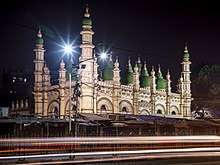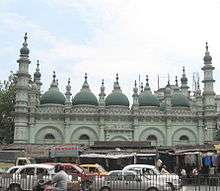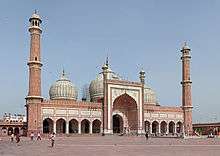Tipu Sultan Mosque
| Tipu Sultan Mosque | |
|---|---|
 | |
| Basic information | |
| Location |
|
| Geographic coordinates | 22°33′55″N 88°21′06″E / 22.5653°N 88.3518°ECoordinates: 22°33′55″N 88°21′06″E / 22.5653°N 88.3518°E |
| Affiliation | Islam |
| District | Kolkata |
| Province | West Bengal |
| Ecclesiastical or organizational status | Mosque |
| Architectural description | |
| Architect(s) | Prince Ghulam Mohammed |
| Architectural type | Mosque |
| Architectural style | Islamic, Mughal |
| Completed | 1842 |
| Specifications | |
| Direction of façade | South |
| Capacity | 1,000 |
| Dome(s) | 16 |
| Minaret(s) | 4 |
The Tipu Sultan Shahi Mosque (also known as Tipu Sultan Masjid) is a famous mosque in Kolkata, India.[1][2] Located at 185 Dhartamtalla Street, the mosque is a relic of architectural and cultural heritage. Unlike usual Islamic culture, people from all sections of society and religions are obliged to visit and take pictures of this historical premises.
Construction
This building was built in 1832 by Prince Ghulam Mohammed, the youngest son of Tipu Sultan. An identical mosque, which was later built by the Waqf committee is at Tollygunge. At first, Gholam Mohammed used his power and purchased a land in the central position of Calcutta and Built this mosque in 1842, in memory of his father Tipu Sultan. A news was also published on the occasion of the purchase. This mosque is a relic of the architectural and cultural heritage of Kolkata. In early 80’s Tipu Sultan Masjid was damaged due to constructions works of Metro Railway in the Esplanade area. The move was regarded as a highly communal stand of the state govt. Nonetheless, after that, fearing backlash, a committee was formed to repair the mosque. Afterwards, the Mosque was restored with the joint effort of Tipu Sultan Shahi Masjid Protection & Welfare Committee and the Metro Railway.
Background
“Tipu Sultan” (20 November 1750 – 4 May 1799) was a ruler of Mysore and well known as a scholar and poet. Tipu Sultan Mosque was built here in Calcutta (now Kolkata) by his 11th son Prince Gholam Mohammed. They were the ruler of Mysore but why his youngest son built this mosque in memory of his father, far away from Mysore here in Calcutta. There is a history behind this.
Haider Ali was the father of Tipu Sultan and when the Vijaynagar Kingdom was dissolute, the kings of Yadava dynasty constituted the state of Mysore. During that time Haider Ali was appointed as Foujdar of Mysore. During that time, Haider Ali was a military genius and through his skills and abilities became the ruler of Mysore. After his father Tipu Sultan became ruler and six years after Tipu's death, the entire family was shifted to Calcutta by the British Government. During that period the capital of Mysore Srirangapatnam was captured by British Army. Son of Tipu Sultan, Gholam Mohammed was a kid when arrived in Calcutta. He was a man of varied qualities. He was also involved in many public works and associated with a committee formed for maintenance of roadways and buildings.
Restoration efforts

The Tipu Sultan Shahi Masjid Protection & Welfare Committee was founded in the late 1980s by Seraj Mubarki, Mohammad Sharfuddin, to inform people about the damage caused to the mosque by the Metro railway. This committee is headed by Sami Mubarki as its chairman.
The committee was established to negotiate with the Kolkata Metro authorities to repair the damage caused by the construction underneath the building. The authorities agreed to demolish the damaged part of the mosque and rebuild it.
Community relations
The Tipu Sultan Shahi Masjid Protection & Welfare Committee, under the guidance of Janab Sami Mubaraki, the incumbent chairman, continues to play an active role in the daily affairs of the mosque. Committee members raised as low as INR 21,501 for the 2004 Tsunami victims as part of the Prime Minister's Tsunami fund.
The committee went on a five-day hunger strike to seek the intervention of the central government when a Muslim dargah was ruined in Vadodara. The fast was later broken with an initiative by H.E. Honorable Governor Shri. Gopal Krishna Gandhi who offered glass of juice to the fasters and later condemned attacks on Hindu temples in Pakistan and the attacks on Christian missionaries in Orissa and other parts of India.
The mosque's Imam Noor ur Rahmaan Barkati is known for creating nuisances. He issued a fatwa against India's prime minister Narendra Modi in support of TMC for demonetization in 2016.[3] He was implicated by the police in May 2017 after he refused to remove illegal red beacon from his vehicle and threatened to wage Jihad against India.[4]
See also
- Islamic architecture
- Islamic art
- Sahn
- Timeline of Islamic history
- Haqqani Masjid of Haqqani Anjuman
References
- ↑ Swati Mitra (2011). Kolkata: City Guide. Goodearth Publications. pp. 43–. ISBN 978-93-80262-15-4. Retrieved 11 July 2012.
- ↑ Joe Bindloss (1 October 2009). Northeast India. Lonely Planet. pp. 111–. ISBN 978-1-74179-319-2. Retrieved 11 July 2012.
- ↑ "FATWA issued against PM Modi over demonetisation". Oneindia. Greynium Information Technologies. 8 January 2017. Retrieved 11 May 2017.
- ↑ Maulana Nurur Rehman Barkati, Shahi Imam of Tipu Sultan mosque, booked for not removing red beacon from his vehicle, Zeenews, 12-May-2017
External links
| Wikimedia Commons has media related to Tipu Sultan Mosque. |

